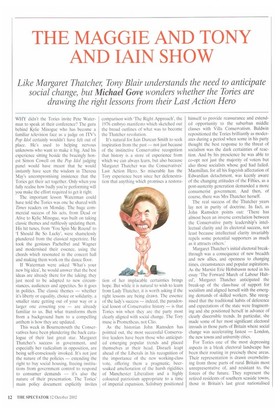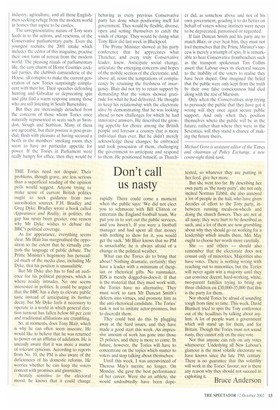THE MAGGIE AND TONY AND IAIN SHOW
Like Margaret Thatcher, Tony Blair understands the need to anticipate
social change, but Michael Gove wonders whether the Tories are
drawing the right lessons from their Last Action Hero
WHY didn't the Tories invite Pete Waterman to speak at their conference? The guru behind Kylie Minogue who has become a familiar television face as a judge on ITV's Pop Idol certainly wouldn't have felt out of place. He's used to helping nervous unknowns who want to make it big. And his experience sitting beside the bracingly honest Simon Cowell on the Pop Idol judging panel would have meant that he would instantly have seen the wisdom in Theresa May's uncompromising insistence that the Tories get their act together. Only when you fully realise how badly you're performing will you make the effort required to get it right.
The important lesson Waterman could have told the Tories was one he shared with Times readers on Monday. The huge commercial success of his acts, from Dead or Alive to Kylie Minogue, was built on taking classic themes and ruthlessly updating them. His hit tunes, from 'You Spin Me Round' to 'I Should Be So Lucky', were shamelessly plundered from the classical repertoire. He took the geniuses Pachelbel and Wagner and modernised their essence. using the chords which resonated in the concert hall and making them work on the dance floor.
If Waterman were asked 'What's your new big idea', he would answer that the best ideas are already there for the taking; they just need to be adapted to new circumstances, audiences and appetites. So it goes in politics. The classic themes — whether it's liberty or equality, choice or solidarity, a smaller state getting out of your way or a larger one cosseting you — are already familiar to us. But what transforms them from a background hum to a compelling anthem is how they are updated.
This week in Bournemouth the Conservatives have been plundering the back catalogue of their last great star. Margaret Thatcher's success in government, and especially her radicalism in opposition, are being self-consciously invoked. It's not just the nature of the policies — extending the right to buy social housing, freeing institutions from government control to respond to consumer demands it's also the nature of their presentation. The Tories' main policy document explicitly invites comparison with 'The Right Approach', the 1976 embryo manifesto which sketched out the broad outlines of what was to become the Thatcher revolution.
It's natural t'or fain Duncan Smith to seek inspiration from the past — not just because of the instinctive Conservative recognition that history is a store of experience from which we can always learn, but also because Margaret Thatcher was the Conservatives' Last Action Hero. So miserable has the Tory experience been since her defenestration that anything which promises a restora
tion of her implacable certainties brings hope. But while it is natural to wish to learn from Lady Thatcher, it is worth asking if the right lessons are being drawn. The essence of the lady's success — indeed, the paradoxical lesson of Conservative history — is that Tories win when they are the party most clearly aligned with social change. The Tory muse is Prometheus, not Clio.
As the historian John Ramsden has pointed out, the most successful Conservative leaders have been those who anticipated emerging popular trends and placed themselves at their head. Disraeli leapt ahead of the Liberals in his recognition of the importance of the new working-class vote, offering them a pragmatic, beersoaked amelioration of the harsh rigidities of Manchester Liberalism and a highly coloured patriotism appropriate to a time of imperial expansion. Salisbury positioned himself to provide reassurance and extended opportunity to the suburban middle classes with Villa Conservatism. Baldwin repositioned the Tories brilliantly as moderates during a period when some in his party thought the best response to the threat of socialism was the dark certainties of reaction. And by his prescience he was able to co-opt not just the majority of voters but also those socialists whose god had failed. Macmillan, for all his fogeyish affectation of Edwardian detachment, was keenly aware of the changing attitudes of the Fifties, as a post-austerity generation demanded a more consumerist government. And then, of course, there was Mrs Thatcher herself.
The real success of the Thatcher years lay not in purity of doctrine. In fact, as John Ramsden points out: 'There has almost been an inverse correlation between the Conservative party leadership's intellectual clarity and its electoral success, not least because intellectual clarity invariably repels some potential supporters as much as it attracts others.'
Margaret Thatcher's initial electoral breakthrough was a consequence of new breadth and new allies, and openness to changing times, circumstances and popular aspirations. As the Marxist Eric Hobsbawm noted in his essay 'The Forward March of Labour Halted', Margaret Thatcher anticipated the break-up of the class-base of support for socialism and aligned herself with the emerging demands of skilled workers. She recognised that the traditional habits of deference and expectations of the state were fragmenting and she positioned herself in advance of clearly discernible trends. In particular, she made some of her most significant electoral inroads in those parts of Britain where social change was accelerating fastest — London, the new towns and university cities.
For Tories one of the most depressing aspects in a bleak electoral landscape has been their routing in precisely these areas. Their representation is drawn overwhelming from those parts of rural Britain most unrepresentative of, and resistant to, the forces of the future. They represent the retired residents of southern seaside towns, those in Britain's last great nationalised industry, agriculture, and all those Englishmen seeking refuge from the modern world in homes that aspire to be castles.
The unrepresentative nature of Tory seats feeds in to the actions, and reactions, of the Conservative parliamentary party. Even the youngest recruits, the 2001 intake which includes the editor of this magazine, practise their own form of retreat from the modern world. The pleasing rituals of parliamentary life, the easy charm of Home Counties cocktail parties, the clubbish camaraderie of the House, all conspire to make the current generation of new Tories surprisingly complacent with their lot. Their speeches defending hunting and Gibraltar or deprecating spin and glitz find a warm response among those who are still listening in South Barsetshire.
But they are increasingly detached from the concerns of those whom Tories once naturally represented in seats such as Swindon. Slough and Surbiton. Many of them are agreeable, but their posture is post-prandial; flush with pleasure at having secured a berth in the members' smoking room, they seem to have no particular appetite for power. If the Tories in Parliament were really hungry for office, then they would be behaving as every previous Conservative party has done when positioning itself for government. They would be flexible, diverse, open and setting themselves to catch the winds of change. They would be doing what Tony Blair did last week in Blackpool.
The Prime Minister showed at his party conference that he appreciates what Thatcher, and every truly Conservative leader, knew. Anticipate social change, articulate the emerging concerns and hopes of the mobile section of the electorate, and, above all, resist the temptations of complacency by retaining the freshness of insurgency. Blair did not try to retain support by demanding that the voters showed gratitude for what he had delivered. He thought to keep his relationship with the electorate alive by demonstrating that he was looking ahead to new challenges for which he had innovative answers. He described the growing appetite for choice among the British people and foresaw a country that is more individual than ever, But he didn't merely acknowledge these changes; he embraced and took possession of them, challenging the government to anticipate and respond to them. He positioned himself, as Thatch
er did, as somehow above and not of his own government, goading it to do better on behalf of voters whose instincts were never to be deprecated, patronised or regretted.
If lain Duncan Smith and his party are to match Blair, or ever beat him, they must not fool themselves that the Prime Minister's success is merely a triumph of spin. It is remarkable to hear Conservative frontbenchers such as the transport spokesman Tim Collins assert that Labour owes its electoral success to the inability of the voters to realise they have been duped. One imagined the belief that the public were only kept from the truth by their own false consciousness had died along with the rest of Marxism.
Only when the Conservatives stop trying to persuade the public that they have got it wrong will they once again secure public support. And only when they position themselves where the public will be in the future, rather than where they were in the Seventies, will they stand a chance of making the future theirs.
Michael Gave is assistant editor of the Times and chairman of Policy achange, a new centre-right think-tank.



































































































 Previous page
Previous page